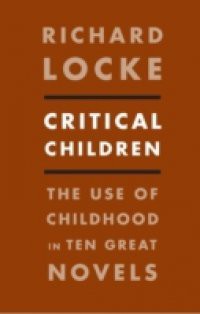In Critical Children, Richard Locke follows child characters in classic novels for adults and their use in exploring or evading social, psychological, and moral problems. Moving from Dickens's Oliver Twist, David Copperfield, and Pip in Great Expectations to Mark Twain's Tom Sawyer and Huckleberry Finn; from Henry James's Miles and Flora in The Turn of the Screw to J. M. Barrie's Peter Pan and his modern American descendent, J. D. Salinger's Holden Caulfield in Catcher in the Rye; and finally to Vladimir Nabokov's Lolita and Philip Roth's Alexander Portnoy, Locke traces the 130-year evolution of these iconic characters.Writing as editor, teacher, writer, and reader, Locke demonstrates the way these great books work, how they spring to life from their details, and how they function as verbal performances that both invite and resist interpretation and support rereading. Locke conveys the variety and continued vitality of these books as they shift from Victorian moral allegory to New York comic psychoanalytic monologue, as children evolve from agents of redemption to narcissistic prisoners of guilt and proud rage.

